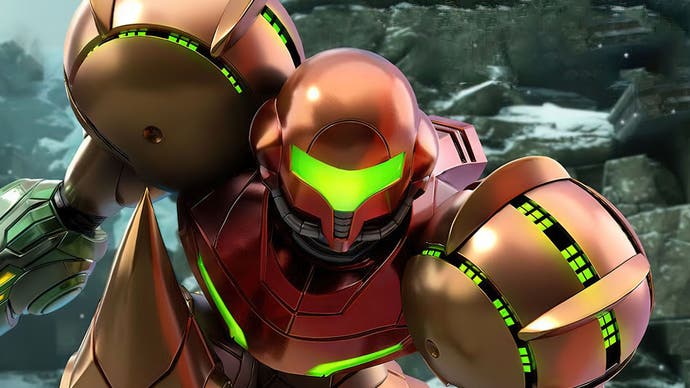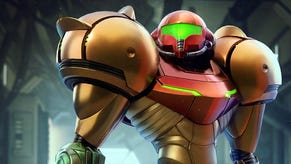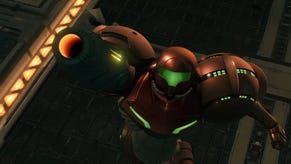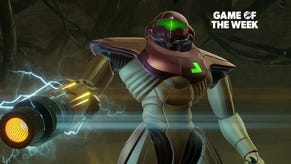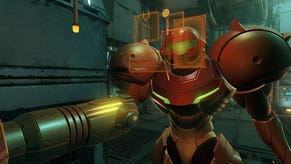Metroid Prime Remastered: a sublime reworking of a stone-cold classic
An approachable, beautiful refinement of the GameCube original.
The original Metroid Prime is one of the most beloved games of all time, adapting the classic 2D Metroid formula into a full 3D open-ended world on GameCube. The game pushed visual boundaries, with dense, moody environments and a solid 60fps frame-rate target. More than 20 years on, the Switch remaster is here: a complete visual remake of the source material, retaining the same gameplay but with radically overhauled graphics and modern controls. Metro Prime Remastered ought to be the best way to experience this legendary title in the modern era, but how does it compare to the GameCube and Wii versions, what's the story with performance - and is anything left out?
On the surface, Metroid Prime: Remastered seems like a pretty straightforward remake, with Retro Studios and co-developer Iron Galaxy seemingly taking the original Metroid Prime code and running it within a newer version of Retro's in-house game engine. Where Remastered distinguishes itself with the sheer quality of the visuals on display - faithful to the original but with massively expanded fidelity and rendering complexity to a level that we rarely see from Switch games.
The Remaster is defined by its new lighting which pushes way beyond what was possible with sixth-gen console hardware, with a sophisticated baked lighting solution with beautiful light propagation, including bounce lighting, subtle shadowing and plenty of fog. This makes areas more lifelike; they look and feel integrated in a way that we don't see from many Switch games. The lighting upgrade is completed by the addition of new light sources, while existing objects gain emissive properties. There's even static volumetric-style lighting in many spots that looks quite convincing.
Materials also exhibit accurate lighting response with the game's dense, naturalistic environments packed with stonework, trees, and foliage all looking correct. Specularity is usually kept to a minimum, but environments like the downed frigate also showcase good-looking reflectivity across artificial surfaces.
There is one caveat here though. In the original Metroid Prime, beam weapons cast dynamic lights throughout the environment when you fired them. This was vertex-based rather than per-pixel lighting due to hardware constraints, but despite looking awkward at times, this made the world feel more reactive to player input. Remastered lacks these effects outside of smaller corridors. The game is still a massive step up from the original release, but this concession is worth noting.
Metroid Prime's models and textures have also been completely remade for this version. Prime's original asset work looked good for the period, with impressive geometric density and solid texturing, but they don't hold up well to modern scrutiny. The new models boast higher polygonal complexity and refined textures; every asset appears to have been completely remade to suit the capabilities of the Switch hardware, with loads of incidental detail added.
Remastered does a good job of keeping things in a sort of rough alignment with the original. All the major bits of geometry from the original game are represented in the new game, so area designs feel faithful even with the new artwork. There's a cliche about remakes showing you a game as you remember it, not as it actually was, and it's especially true here - everything feels familiar despite the massive improvement in fidelity.
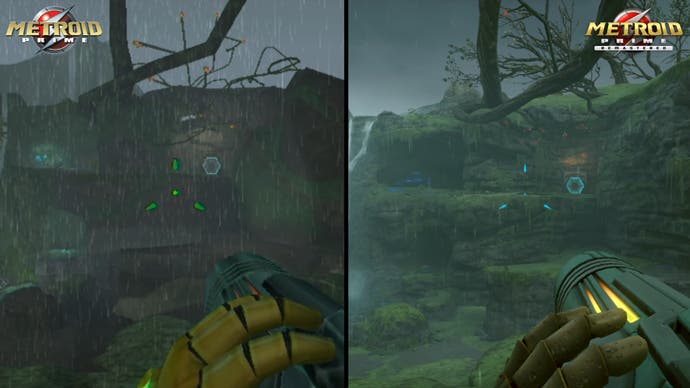
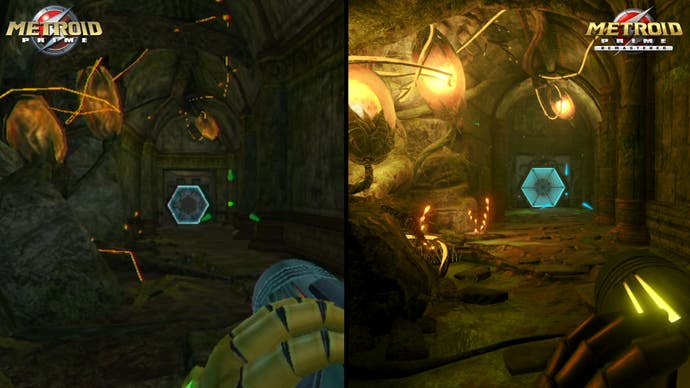
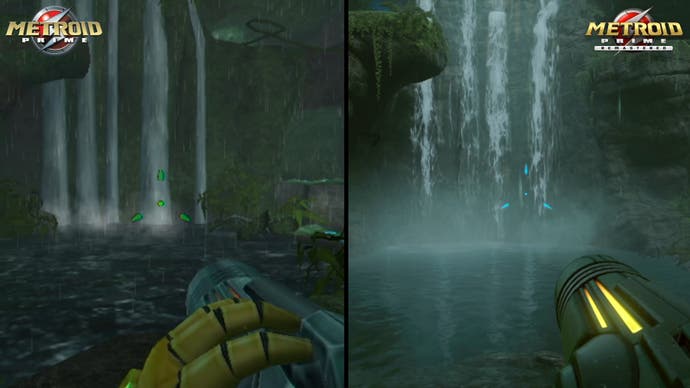
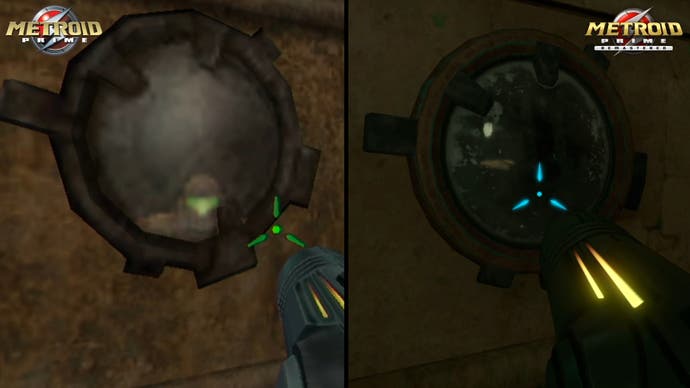
Most of the novel effects from the original game have been replicated here too. The visor still occasionally fogs up, gets covered in guts or shows the reflection of Samus's face. The helmet responds to environmental lighting and is also now affected by player weapons fire too, lighting up as you fire the various beam projectiles.
Water behaves in much the same way as in the original too, with raindrops colliding with the player weapon, now leaving trails on the cannon itself too. The geometry-based water ripple effect from the original is replicated, alongside more intricate deformation in smaller pools of water. Surface detail on the water itself looks much more pleasing now, with normal-mapped ripples and cubemap-based reflections, though the cubemaps do fall out of alignment fairly easily.
Speaking of reflections, the glossy domes in the Chozo Ruins area no longer reflect Samus despite boasting a plausible-looking cubemap-based reflection - Samus is simply nowhere to be found. In the original this seemed to be based on a simple texturing trick and replicating this at a suitable level of fidelity in a modern graphics engine would be expensive, so its absence is understandable.
At its core, Metroid Prime: Remastered is a port of the original game, so it makes sense that the animation data from the 2002 release has been largely re-used. Enemy animation appears to largely be a match for the source material, and cutscenes basically line up one-to-one in object and camera movement. Mostly the original work holds up just fine here, thanks to stylised enemies with dramatic proportions, with only a few small camera tweaks in cutscenes.
In terms of controls, Metroid Prime: Remastered uses controls that mirror modern first-person standards by default, but you can switch to the original controls if you prefer. Other options include the Wii-style gyroscope-based pointer controls and a hybrid option that uses the classic control scheme alongside a gyroscope-based free aim mode.
In terms of image quality, the new game operates at 900p in docked mode and 600p in portable mode, with no sign of dynamic resolution scaling and no anti-aliasing. The lack of AA is unusual for a modern title but doesn't stand out too badly thanks to the lack of real-time effects and specular environmental elements, only really noticeable in metallic, artificial structures.
Performance is very straightforward, which is a good thing. I didn't spot any noticeable frame-rate dips across my testing, with a locked 60fps throughout in both docked and portable modes. The new release shines in portable play, particularly on the OLED Switch model, where the darker hues of the revamped lighting really pop. The mildly sub-native presentation is scarcely an issue - Remastered just looks awesome on a seven-inch screen.
Loading times are virtually non-existent too, with a short initial load and some brief loading cutscenes during elevator rides, but otherwise zero interruptions to the experience. That was famously true of the original release as well to an extent, but you often had to wait a few moments around doors waiting for them to open as the game fetched data, which never happens in Remastered.
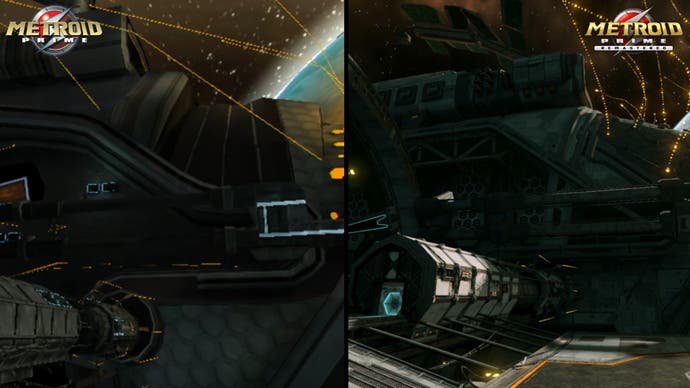
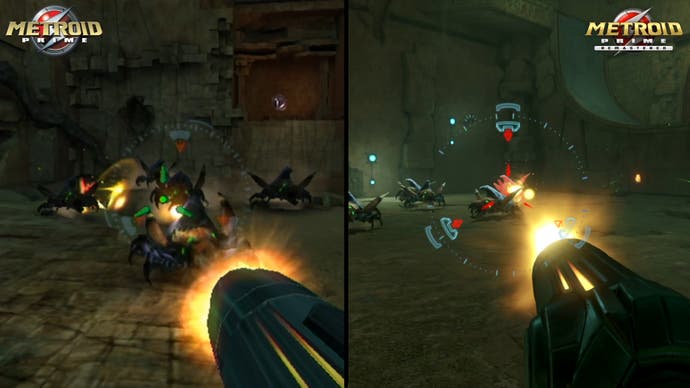
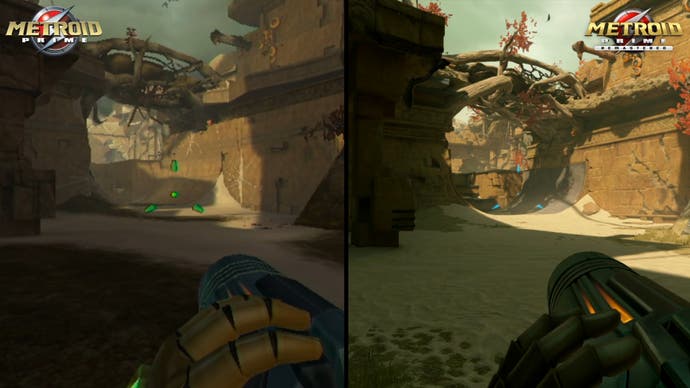
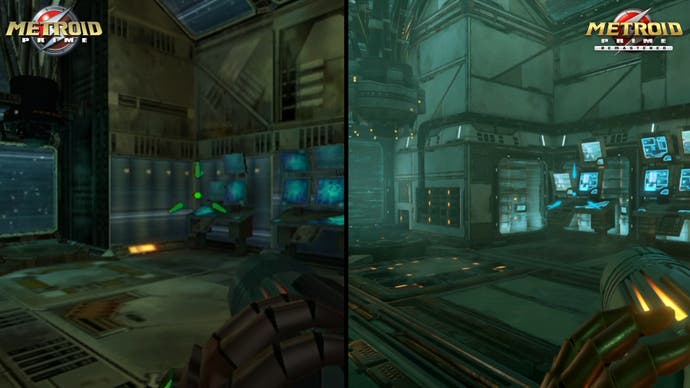
Metroid Prime is still a fantastic game. Traversing through an unknown, hostile environment, searching for power-ups and solving environmental puzzles is still fresh and exciting some two decades on. Some quirks remain intact, like a heavy reliance on backtracking and a slightly unforgiving save system, but in some ways it's a refreshing change of pace from modern releases. The control tweaks at least make the game feel much more in-tune with modern sensibilities, making this the best way to experience Metroid Prime in the modern era.
The visual improvements help enormously as well, of course. Metroid Prime is a beautiful Switch game that makes clever use of the hardware to deliver a visually sophisticated experience while still hitting a rock-solid 60fps frame-rate target. This is one of the best-looking Switch titles I've seen, and it shows just what the Tegra X1-based console is capable of when carefully catered to in an exclusive title. Remastered feels very true to the source game despite the massive graphical leap as well, closely adhering to the original visual language while filling out and expanding every conceivable detail.
Oddly enough, Retro's overall approach reminds me a lot of Halo 2 Anniversary. That title also took a sixth-gen console game and brought it up to a top-class visual standard while still respecting the source material. Metroid Prime: Remastered might even be a cut above that effort, owing largely to the sophistication of its lighting. Other Halo games - Halo 4 in particular - also feel like good points of reference for the general visual look that Remastered is aiming for, although I do feel there may be a bit of cross-pollination there.
As Retro Studios' first proper game release since the Wii U version of Donkey Kong Country: Tropical Freeze in 2014, this is a remarkably accomplished effort that shows the developer is still firing on all cylinders. The strength of this game, and in particular the technology that powers it, is of special interest too since Retro is also slated to deliver Metroid Prime 4 after taking over the project four years ago. A lot seems up in the air still, but this level of visual fidelity would really suit a new Prime title. Retro's in-house graphics engine seems to have been significantly enhanced, all while retaining a firm grip on the 60fps target that has defined the mainline Metroid Prime games.
Metroid Prime: Remastered is a more approachable and beautifully refined take on the sixth-gen original that holds up as a stunning game on its own terms. Remastered is a top-quality modernisation of a classic game, and it's well worth your time.
